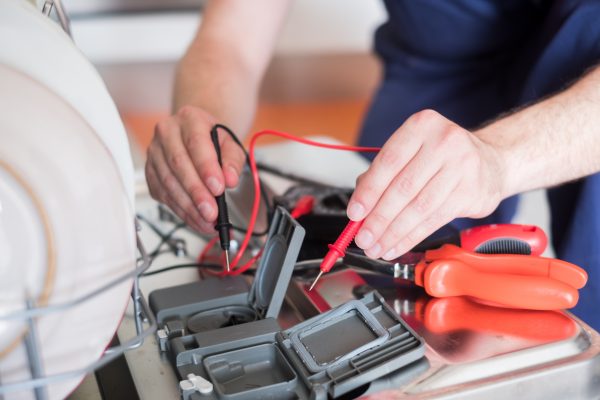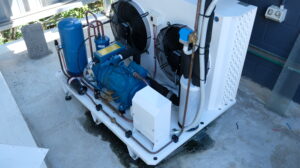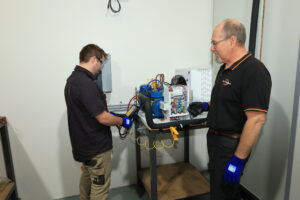Australia’s workplace safety regulations are a crucial part of keeping workers safe. When it comes to electrical equipment, faults in portable appliances can be deadly. For that reason, businesses are required to test and tag their devices to ensure electrical safety in the workplace.
Testing and tagging can be performed by a competent person within your business, or a third-party technician. In either case, the technician will check equipment to make sure it’s safe to use.
Each Australian state and territory has its own requirements for test and tag procedures. In this article, we’ll look at test and tag regulations in QLD and see why they’re so important.
What is Test and Tagging?
Testing and tagging is the process of inspecting electrical equipment to ensure it is functional and safe to use. Test and tag is required to comply with Workplace Health and Safety Standards in Australia. In addition, each state has its own regulatory body that oversees the licensing of competent technicians.
Most types of portable electrical equipment need to be regularly tested and tagged. Requirements vary by industry, but most businesses test equipment like:
- Extension leads and power boards
- Handheld tools
- Handheld cleaning machinery
- Laptops and chargers
- Portable RCD’s
- Fridges and freezers
- Portable electrical equipment
During the test and tag process, a trained technician will conduct a visual inspection for signs of damage to cables, plugs, guards, covers and connectors. If there’s no visible damage, the technician will perform electrical testing to make sure the device works properly.
Devices that pass the test are fitted with a tag and the results are logged. Devices that fail the test may need repairs or maintenance, or they may need to be replaced.
The Benefits of Testing and Tagging Equipment
Test and tag regulations are a crucial part of maintaining equipment safety on worksites. The process ensures staff are protected from faulty electrical devices.
Investing in regular testing and tagging offers a few major benefits:
- Reduced electrical hazards. Testing and tagging is designed to identify electrical faults. Small faults may pose a serious risk to employees or members of the public. Having your appliances regularly tested can identify hazards and reduce the risk to anyone that handles the equipment.
- Compliance to safety standards. Keeping staff safe is a top priority. WorkSafe Queensland has made it a legal requirement that certain types of equipment be regularly tested. This ensures compliance, which keeps staff safe and reduces the risk to your business.
- Increased equipment lifespan. Electrical equipment represents a huge cost for your business. These devices degrade due to normal wear and tear. Test and tag helps you keep track of equipment condition and maintenance schedules. This increases lifespan and reduces lifetime costs.
- Greater workplace efficiency. Testing and tagging makes it easy to stay on top of the condition of equipment. The results of the tagging process can be used to plan maintenance and identify faults before equipment breaks down. This increases reliability, uptime and the efficiency of your business.
Test and Tag Regulations in QLD
In Queensland, test and tag is overseen by WorkSafe QLD and the Electrical Safety Office (ESO).
Businesses that operate in construction are required to test and tag equipment according to AS/NZS 3012 Electrical installations – Construction and demolition sites.
Businesses that operate in the manufacturing, office, service, rural and amusement industries are required to test and tag equipment according to AS/NZS 3760 In-service safety inspection and testing of electrical equipment.
According to AS 3760, test and tag must be carried out by a “competent person.” If you are testing and tagging personal equipment (belonging to you or your own business) then you need to:
- Complete a test and tag course
- Perform testing and tagging to AS 3760 or 3012 standards
- Comply with Queensland’s state regulations
If you are testing and tagging equipment for other people or businesses (e.g. acting as a service provider), you need to:
- Complete a test and tag course
- Apply to the Queensland Electrical Safety Office and obtain a Restricted Electrical Contractors Licence
- Perform testing and tagging to AS 3760 or 3012 standards
- Comply with Queensland’s state regulations
Test and Tag Intervals in QLD
Electrical equipment needs to be tested at regular intervals. The required interval depends on your industry and how the equipment is used:
- Building, construction and demolition: every 3 months
- Factories, warehouses and production: every 6 months
- Environments where equipment is prone to flexing or damage: every 12 months
- Environments where equipment is not prone to flexing or damage: every 5 years
These are the minimum testing intervals set out in Queensland’s regulations. Some companies choose to test equipment more frequently, especially in heavy use environments such as construction.
Test and Tag Colour Code
Equipment that is tested and deemed to be in good condition is fitted with a colour-coded tag.
Coloured tags display the tag number, the name of the testing technician, device information, testing dates and the licence number of the tester.
In Queensland, businesses that operate in construction, demolition or mining are required to use the following colour system:
- Red – for equipment tested between December and February
- Green – for equipment tested between March and May
- Blue – for equipment tested between June and August
- Yellow – for equipment tested between September and November
If you don’t work in the above industries, you can use your own colour coding system.
The colour of the tag denotes when the last test was performed. This allows businesses and auditors to see when the next test is due at a glance.
Test and Tag in Other Australian States
Each Australian state maintains its own electrical regulatory bodies to oversee test and tag procedures. While each state uses the same AS 3760 and 3012 standards, regulatory bodies have their own licencing and testing requirements:
- Queensland – WorkSafe QLD
- Victoria – Victorian WorkCover Authority
- New South Wales – Safe Work NSW
- South Australia – SafeWork SA
- Western Australia – WorkSafe WA
- Tasmania – WorkSafe Tasmania
Northern Territory – WorkSafe NT
Keep Your Business Moving with a Test and Tag Statement of Attainment at Get Skilled Training!
Test and tag is a major requirement for businesses in Queensland to ensure workplaces remain electrically safe. While you can hire third-party contractors to carry out the work, it’s usually more cost-effective to handle the task yourself.
If you want to test and tag equipment within your business, you’ll need to complete a Test and Tag Course through Get Skilled Training! Get Skilled is an RTO that offers test and tag courses in Brisbane, Melbourne, Adelaide, Toowoomba and on the Sunshine Coast. Our nationally accredited courses cover everything you need to obtain your qualification and begin testing and tagging.
You can enrol in a test and tag course online, or contact us to find out more.




